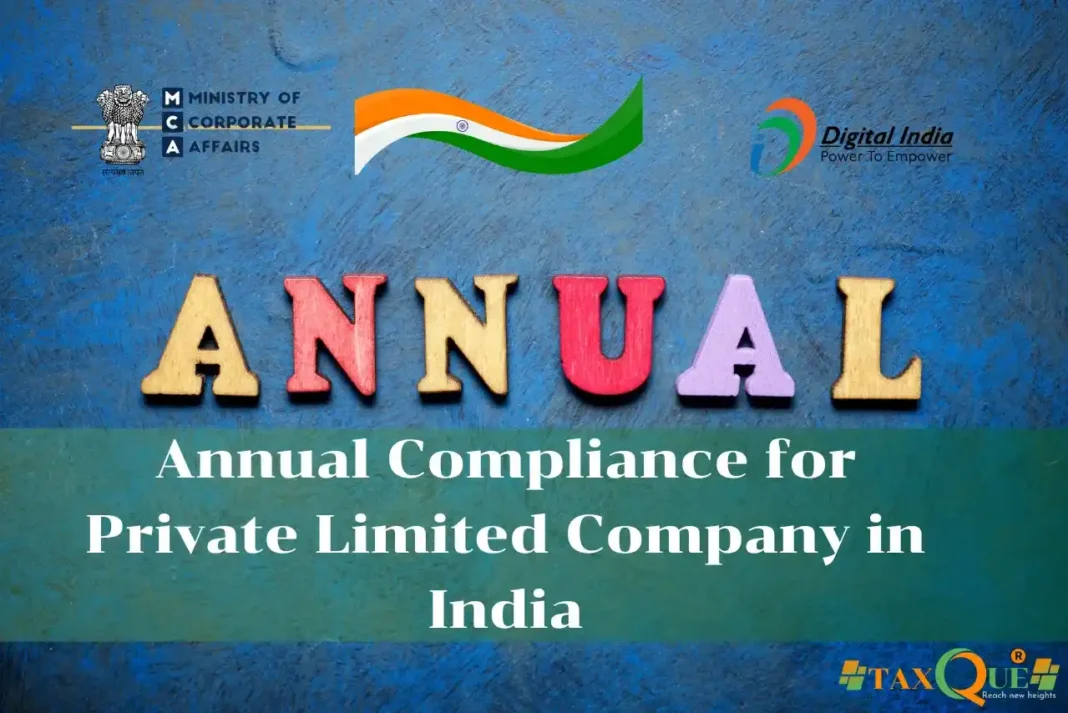Introduction
Company compliance is a critical aspect of running a business in India, ensuring adherence to legal and regulatory requirements under laws like the Companies Act, 2013, GST Act, and Income Tax Act, 1961. Non-compliance can lead to penalties, legal issues, or reputational damage. This blog explores company compliance in India, detailing key obligations, processes, and how platforms like TaxQue can streamline compliance for businesses.
What Is Company Compliance?
Company compliance refers to the process of meeting statutory and regulatory obligations imposed on companies by government authorities. For Indian businesses, this includes filings with the Registrar of Companies (ROC), tax compliance, and adherence to labour laws. Proper company compliance builds trust with stakeholders and ensures smooth operations.
1. Key Areas of Company Compliance in India
To maintain company compliance, businesses must address these core areas:
- ROC Filings: Annual returns, financial statements, and event-based filings with the Ministry of Corporate Affairs (MCA).
- Tax Compliance: Filing GST returns, Income Tax Returns (ITR), and TDS/TCS returns.
- Labour Law Compliance: Adhering to Provident Fund (PF), Employees’ State Insurance (ESI), and employee-related regulations.
- Audit Requirements: Statutory audits for companies meeting specific turnover or capital thresholds.
2. Important Compliance Requirements
Here’s a detailed look at company compliance obligations:
| Compliance Type | Requirement | Frequency |
|---|---|---|
| ROC Annual Return (Form AOC-4, MGT-7) | File financials and annual return | Annually |
| GST Returns (GSTR-1, GSTR-3B) | Report sales and tax payments | Monthly/Quarterly |
| ITR Filing (ITR-6 for companies) | File income tax return | Annually |
| TDS/TCS Returns | Report deducted/collected tax | Quarterly |
| Statutory Audit | Audit financials by a CA | Annually |
- ROC Filings: Submit Form AOC-4 (financial statements) within 30 days and MGT-7 (annual return) within 60 days of the Annual General Meeting (AGM).
- GST Compliance: File GSTR-1 (sales) and GSTR-3B (summary) by the 10th–20th of the following month.
- ITR Filing: Companies file ITR-6 by October 31 for FY 2024-25 (non-audit cases).
- TDS/TCS: File quarterly returns (Form 24Q for salaries, 26Q for non-salaries, or 27Q for foreign payments).
3. Steps to Achieve Company Compliance
Follow these steps to ensure company compliance in India:
Step 1: Register and Obtain Licenses
- Register the company with MCA to obtain a Certificate of Incorporation.
- Apply for PAN, TAN, and GSTIN for tax compliance.
- Secure labour law registrations (e.g., PF, ESI) if employing staff.
Step 2: Maintain Statutory Records
- Keep accurate books of accounts, board meeting minutes, and shareholder records.
- Update statutory registers (e.g., Register of Members, Directors).
Step 3: File Regular Returns
- Submit ROC filings via the MCA portal.
- File GST returns on the GST portal.
- File itr and TDS returns on the Income Tax portal.
Step 4: Conduct Audits
- Appoint a statutory auditor within 30 days of incorporation.
- Conduct annual audits if turnover exceeds ₹40 lakh (services) or ₹100 lakh (goods).
Step 5: Monitor Deadlines
- Use compliance calendars to track due dates for filings.
- Leverage platforms like TaxQue for reminders and automated filings.
4. Consequences of Non-Compliance
Failing to maintain company compliance can result in:
- Penalties: Fines for late ROC filings (₹100/day), GST returns (₹200/day), or ITR (up to ₹5,000).
- Legal Action: Disqualification of directors or company dissolution.
- Reputation Loss: Loss of trust from investors, customers, and partners.
TaxQue simplifies company compliance with expert guidance on ROC, GST, and ITR filings. Explore TaxQue’s GST services or ROC compliance guide for tailored support.
FAQs
1. What is the deadline for ROC annual filings?
Form AOC-4 (financial statements) is due within 30 days of the AGM, and MGT-7 (annual return) within 60 days.
2. Is GST filing mandatory for all companies?
Yes, if the company’s turnover exceeds ₹20 lakh (services) or ₹40 lakh (goods), GST registration and filing are mandatory.
3. What happens if I miss ITR filing deadlines?
You may face a penalty of up to ₹5,000 and interest on unpaid taxes under Section 234A of the Income Tax Act.
4. Can small companies skip statutory audits?
Small companies with turnover below ₹40 lakh (services) or ₹100 lakh (goods) may be exempt from statutory audits, but company compliance still requires consulting a chartered accountant to ensure accurate ROC and tax filings.
5. How does TaxQue assist with company compliance?
TaxQue provides automated filing tools, deadline reminders, and expert support for GST, ITR, and ROC obligations. Visit TaxQue’s compliance services to learn how it streamlines company compliance for businesses of all sizes.
Conclusion
Company compliance is the backbone of a legally sound business in India. By staying on top of ROC filings, GST returns, ITR submissions, and audits, companies can avoid penalties and build credibility. Platforms like TaxQue make company compliance effortless with automated tools and expert advice. Start planning today, track deadlines, and ensure your business thrives in a compliant environment.





